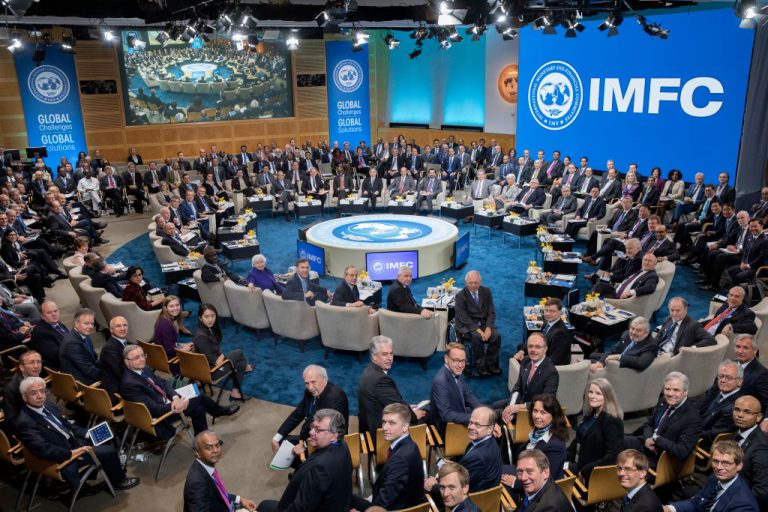The International Monetary Fund (IMF) organized and conducted a cyberattack training simulation targeting global financial infrastructure the same day as the new Apache log4j (Log4Shell) exploit became public. Ten countries, including Israel, Germany, the United States, and France participated in the event.
In a Dec. 9 exclusive report by Reuters, Israel led the event, described as “an attempt to increase cooperation that could help to minimise any potential damage to financial markets and banks.”
“The simulated ‘war game’, as Israel’s Finance Ministry called it and planned over the past year, evolved over 10 days, with sensitive data emerging on the Dark Web. The simulation also used fake news reports that in the scenario caused chaos in global markets and a run on banks.”
The event was titled “Collective Strength” and also included the UAE, Austria, Switzerland, Italy, the Netherlands, and Thailand.
RELATED READING:
Success
You are now signed up for our newsletter
Success
Check your email to complete sign up
Reuters quoted the narrator of the simulation as describing the scenario as one that induced a global financial crisis, “The banks are appealing for emergency liquidity assistance in a multitude of currencies to put a halt to the chaos as counterparties withdraw their funds and limit access to liquidity, leaving the banks in disarray and ruin.”
To deal with the catastrophe, extreme measures were enacted such as, “a coordinated bank holiday, debt repayment grace periods, SWAP/REPO agreements and coordinated delinking from major currencies.”
Little details about the simulation appear to be available. However, the IMF website does hold minutes of opening remarks given by Deputy Managing Director Bo Li, a man who formerly held the position of Deputy Governor of the Chinese Communist Party’s People’s Bank of China (PBOC), at a 2021 Cybersecurity Workshop initiated on Dec. 6.
Li’s comments spoke of topics such as “the impact of technology shifting away from improving efficiency and moving toward enabling the transformation of business operations and social interaction.”
The Deputy Managing Director also described cyber resilience as “a societal issue,” noting, “As technology becomes further ingrained in our daily lives, enhancing cyber resilience becomes more dependent on people’s behavior and societal choices than technology itself.”
In the “potential next steps” section of the speech, Li’s narrative turned markedly globalist, “As with other global challenges, a collective effort will be critical. Both public- and private-sectors will need to come together to tackle common problems, such as data recovery. They will also need to work together and utilize new and transformational technologies and data to strengthen our overall cyber resilience.”
“Working across borders, we will need to share information regionally and globally, and we will need to develop a common language for incidents so we can tackle them in a common, united manner.”
Li replaced his countryman, Tao Zhang, also former Deputy Governor of PBOC, and a current member of the globalist World Economic Forum (WEF), this year.
The same day on Dec. 9, a severe, critical exploit against the Apache log4j function, extensively used in many Java-based applications, was made public.
The exploit is so critical and affects so many systems that it led to entities as large as the Government of Quebec and the Canada Revenue Agency taking themselves entirely offline as a preemptive measure.
CNET quoted one cyber security firm as stating it had “detected over 800,000 attempted exploits of the bug in the first 72 hours after it became public.”
An executive for one company specialized in Internet of Things told CNET that while many normal servers and technology providers could simply patch their Apache suites with a fix that has already been released, in the case of security cameras and smart TVs, vulnerabilities may persist.
“Think about how many of these devices are sitting in loading docks or warehouses, unconnected to the internet, and unable to receive security updates…The day they’re unboxed and connected, they’re immediately vulnerable to attack,” he said.
The Government of Switzerland reported the vulnerability had not affected critical infrastructure yet, but was being used to deploy mass-malware to convert normal systems into nodes of botnets that conduct Distributed Denial of Service attacks or quietly mine cryptocurrencies for their creators.
The IMF isn’t alone in its preparations for Internet chaos. In July, the WEF conducted a cyberattack simulation of its own dubbed Cyber Polygon 2021 with a similar purpose, but focused on disruptions of the digital supply chain
Names as enormous as Russia’s state-owned Sberbank, Interpol, IBM, ICANN, and Visa all participated.
In January, the WEF foreshadowed the event somewhat when it published a video titled A Cyber-Attack with COVID-Like Characteristics? that rattled about a virus that would hit the Internet with a pandemic potency “10 times greater than what we’ve experienced with the coronavirus.”
In June, after the video was ratioed with only 265 likes and 1,300 dislikes, the WEF unlisted it from search results.
Some may recall the prophetic Event 201 pandemic preparation event, launched in October of 2019 at approximately the same time the CCP was besieged by the initiation of Wuhan Pneumonia, an illness that was later said to be the World Health Organization-coined Coronavirus Disease 2019 (COVID-19).
Event 201 was conducted in New York by the John Hopkins Bloomberg School of Public Health Center for Health Security, the World Economic Forum, and the Bill and Melinda Gates Foundation.
The Scenario Page of the training exercise described itself as, “An outbreak of a novel zoonotic coronavirus transmitted from bats to pigs to people that eventually becomes efficiently transmissible from person to person, leading to a severe pandemic. The pathogen and the disease it causes are modeled largely on SARS, but it is more transmissible in the community setting by people with mild symptoms.”
A highlight video of the exercise, published by event organizers, is still publicly available online and is shocking in its likeness to how international media and government have handled COVID-19 in the last two years.


















